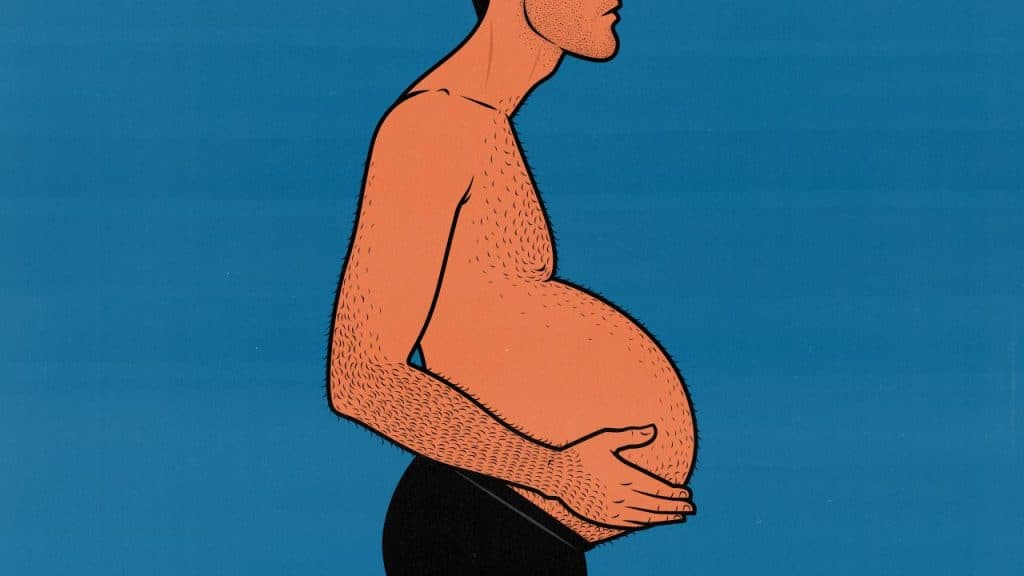
How to Improve Digestion While Bulking
When I first started bulking, I made a slew of healthy changes to my lifestyle. I started lifting weights, getting better sleep, and eating a more nutritious diet. I expected to have more energy, feel more powerful, and look better. That wasn’t my fate. Instead, I felt tired and looked pregnant. It wasn’t fat, either. I still had abs. But instead of being flat, they curved outwards like a turtle shell.
As I continued to pound down the calories, I started feeling perpetually full, bloated, and gassy. I’d often get indigestion, I struggled with acid reflux, and sometimes I’d get diarrhea. My digestive system had never been strong, but now I was suffering from the classic symptoms of Irritable Bowel Syndrome (IBS). I was clearly doing something wrong, but I didn’t know what it was.
I considered going back to my older, smaller, less nutritious diet, but that would mean going back to being skinny, and I wasn’t ready to give up just yet. Fortunately, there are several proven ways to improve digestion. By making a few key changes to my diet, I was able to strengthen my digestive system and banish my digestive woes.
That was 12 years ago. Since then, we’ve helped over 10,000 other skinny people bulk up. Many of them struggled with digestive issues, including IBS. I suspect that’s why so many of us are skinny to begin with. These are the methods we use to manage their symptoms while helping them build more robust digestive systems.
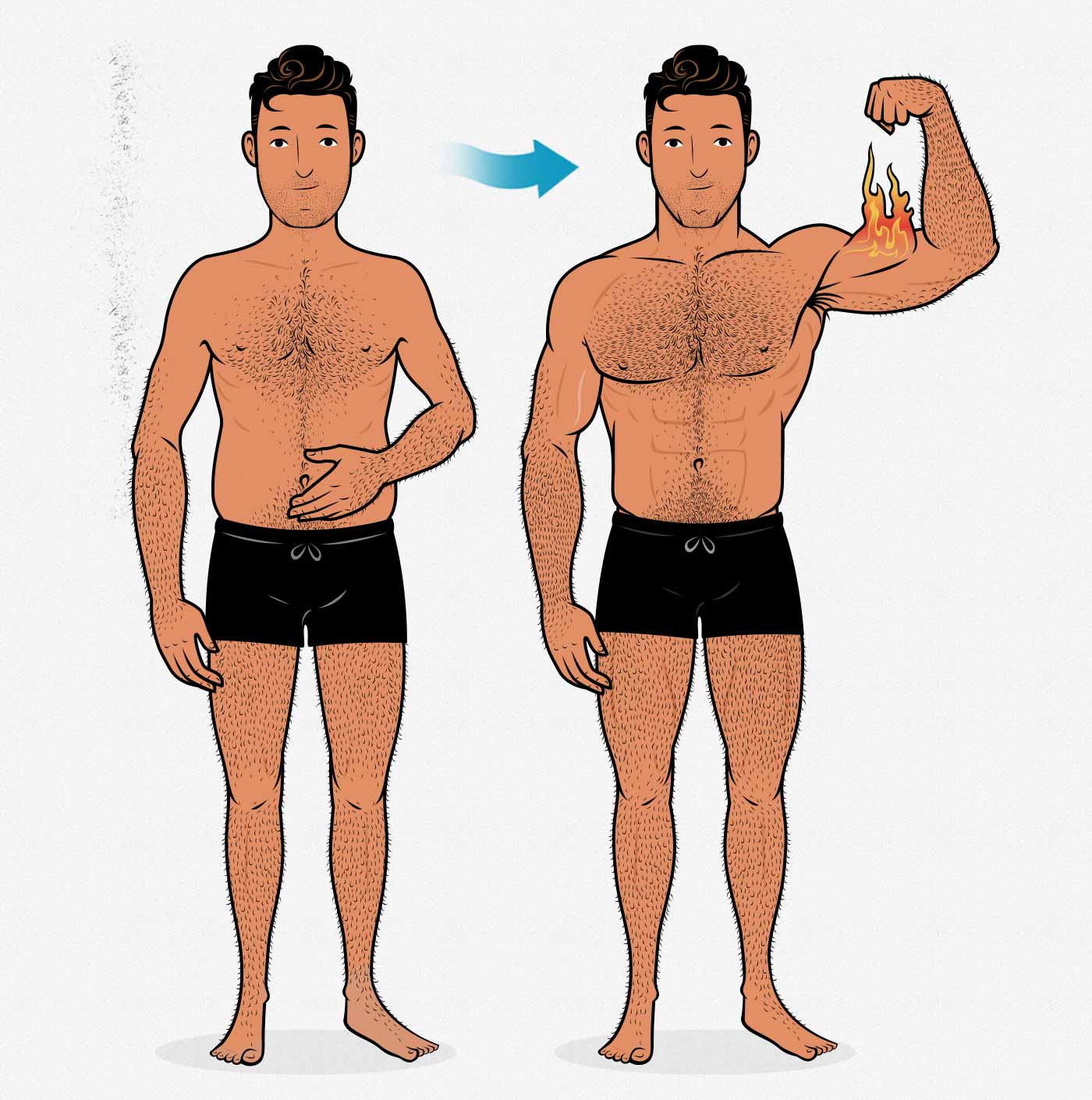
Why Is It Hard to Digest Food?
Eating a more abundant, varied, and nutritious diet can be incredibly good for us, especially if we’re skinny. If combine that diet with a good workout routine and a healthy lifestyle, we can build muscle, gain weight, and bulk up. These are all great things. But it doesn’t always go smoothly. Eating so much extra food can cause problems: bloating, indigestion, gas, constipation, and/or diarrhea.
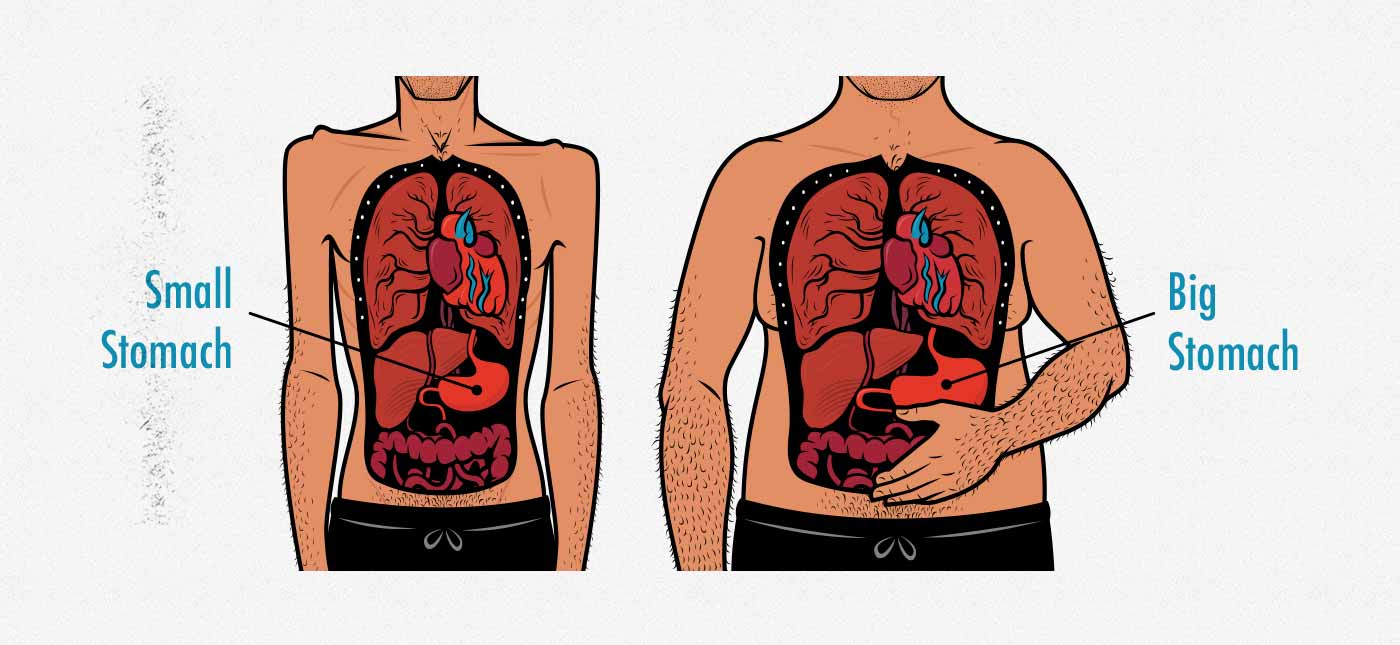
One of the reasons why most skinny guys have trouble with traditional bodybuilding diets is that our stomachs are often smaller than average. If you’re a so-called “ectomorph,” with a thinner frame and a shallower ribcage, that means there’s less room for your stomach. If we compare that against the average man, not only does he have more room in his torso for his stomach, but he also has a history of overeating, which can stretch his stomach, making it bigger.
To make matters even more complicated, skinny guys are often “hardgainers,” in the sense that our metabolisms are more adaptive than normal. When we eat more calories, we spend more time standing, fidgeting, and pacing, burning off the extra energy (study). It’s totally subconscious. We don’t even realize we’re doing it. But it can burn off as much as 950 extra calories per day:
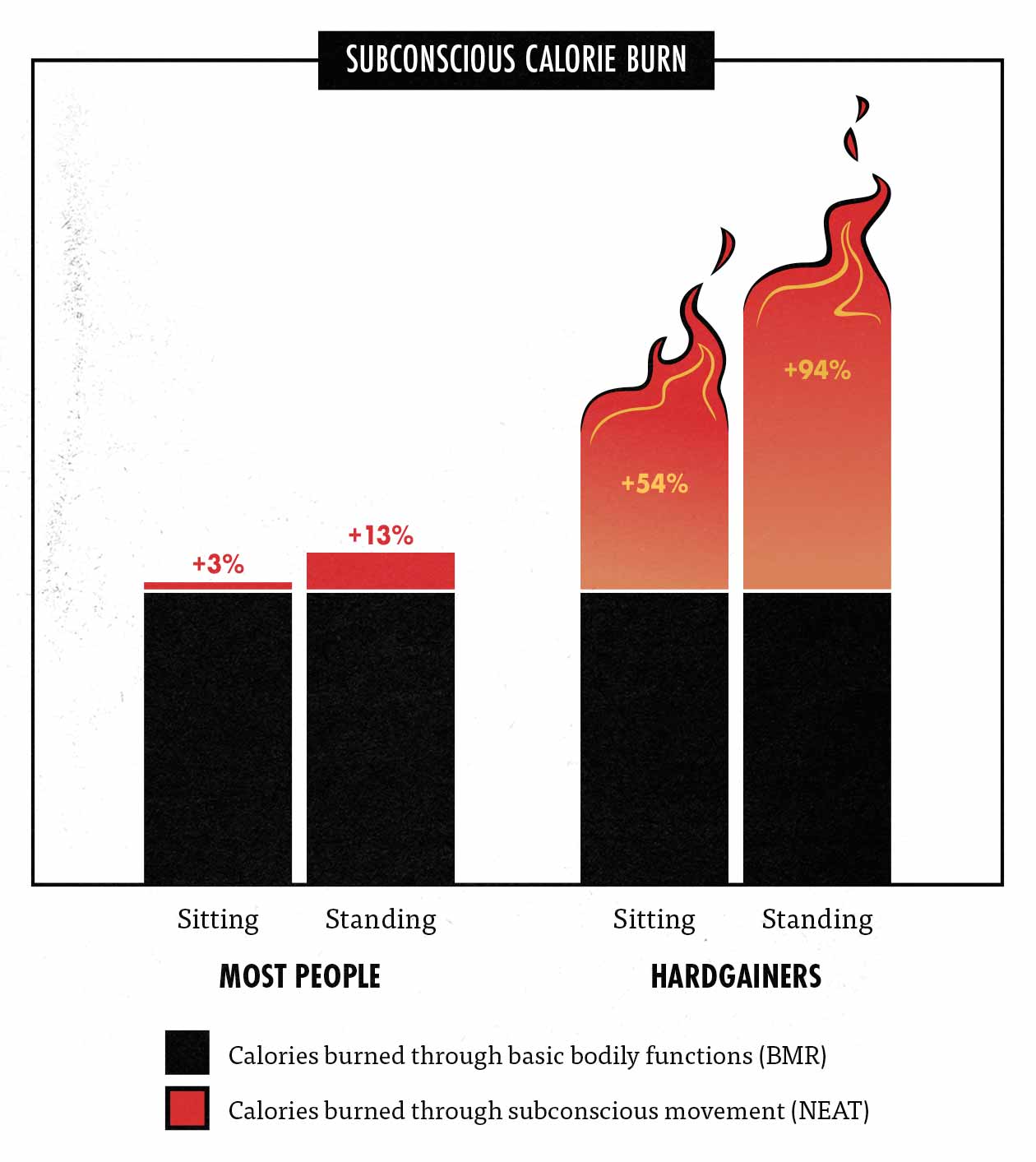
So we have a situation where some skinny guys have more meagre appetites and smaller stomachs, but we also have much greater calorie demands. So we shovel mountains of food down, and we wind up feeling bloated and cramped, and we struggle with acid reflux and indigestion.
Improve Your Diet Gradually
If you’re sick of being skinny, it can seem prudent to totally overhaul your diet, getting rid of what isn’t working and building a better diet from the ground up. During my first bulk, I woke up one morning and started eating a totally alien diet. Nothing was the same. I ate a completely new breakfast, lunch, and dinner. The idea was to bulk properly. It backfired.
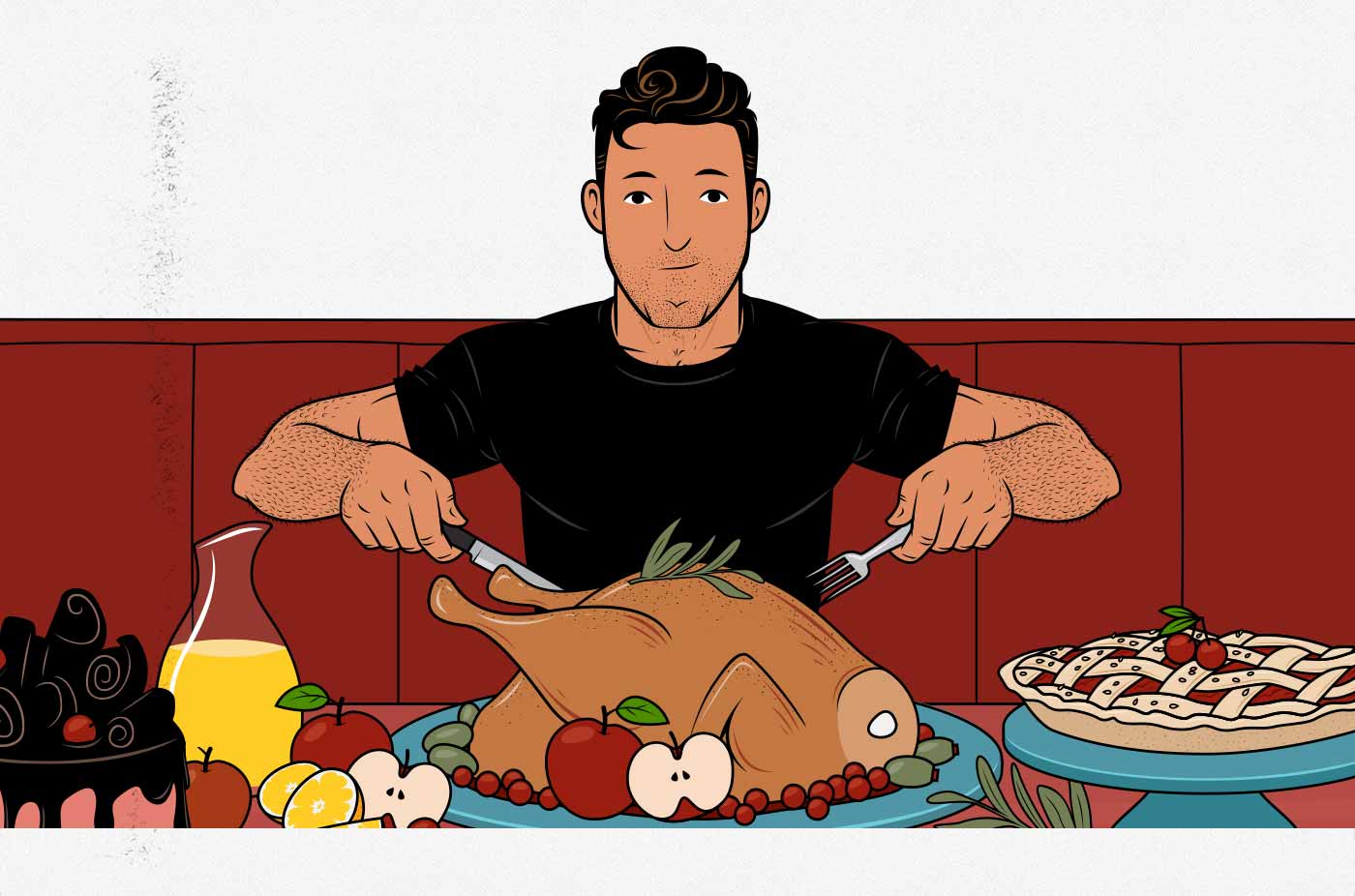
I was eating healthy foods. I wasn’t allergic to any of them. And yet I felt awful. I got bloated, I struggled to digest the food, and I started having acid reflux. In retrospect, it’s easy to see why. My digestive system was confused and overwhelmed. If you’ve ever switched up your diet while travelling, you know what I mean. It’s not that you’re eating bad food; it’s just too different too soon.
Our digestive systems adapt to our diets and lifestyles. We all get used to eating and digesting different foods, in different quantities, at different times. We foster different gut bacteria, produce different digestive enzymes, and get used to digesting different ratios of protein, carbs, and fats. Our stomachs stretch to fit the size of the meals we typically eat.
How to Fix Bloating & Gas While Bulking
It’s pretty common to experience bloating and gas while bulking. The root of the problem is often changing too much, too soon. Too much new food. Too much extra fibre. Too many calories overall.
Here are the most common digestive problems and how to fix them:
- Bulking too aggressively: some skinny guys can benefit from bulking aggressively, gaining weight rapidly. However, that means eating in a larger calorie surplus. If you’re having digestive problems, you may have better luck eating in a smaller surplus, bulking leanly, and gaining weight more slowly.
- Overly large meals: Eating bigger meals is an easy way to eat more calories. The problem is, if your stomach is still small, those bigger meals might not fit. You may find you have trouble digesting those meals, making you feel tired for several hours afterwards. You may even get acid reflux. Most people feel that way after Christmas or Thanksgiving dinner, but you’re inflicting that misery upon yourself every evening. Instead of eating bigger meals, eat more snacks. If you need to eat a bigger meal, walk it off. A 20-minute stroll can work wonders.
- Extreme amounts of specific foods: When you start bulking, you have to get your calories from somewhere. Sometimes, people resort to eating large amounts of specific foods. Litres of milk, cups of peanuts, and mountains of whey. I’m sure you’ve heard that the dose makes the poison. When you eat huge amounts of any one thing, it often causes problems. Instead, eat a wider variety of foods.
- Suddenly adding carbs: Carbs are fantastic for building muscle. They’re rich in energy, fibre, vitamins, minerals, and phytonutrients. However, if you were eating low-carb or ketogenic diet, suddenly adding more carbs into your diet can cause digestive problems. Instead, gradually add carbs back into your diet. Start with small serving sizes. Get used to them. Then consider adding more.
- Intermittent fasting: When you restrict your feeding window, you’re forced to eat larger meals. Larger meals tend to be harder to digest, especially for people like us, with smaller stomachs and more finicky digestive systems. Instead, it’s better to eat smaller meals spread more evenly throughout the day. Start eating shortly after waking up. Have a snack right before bed.
- Milk: Drinking more milk can be a great way to consume more calories, protein, and nutrients. However, to digest milk, we need a digestive enzyme called lactase. If you radically increase your milk intake, you might run out of lactase! So start with smaller servings and gradually increase your intake. Over time, your body will adapt.
- Fibre: when you start eating more fruits, veggies, legumes, and grains, that means you’ll be eating more fibre. And fibre is great. It’s healthy. It’s good for your digestive system. But it’s possible to get too much of a good thing. Eating 30 grams of fibre per day is great, but what about 60 grams? 90 grams? There’s no specific limit. If you’re eating 30 grams, bumping up to 35 might be even better. If you’re eating 60, going up to 65 should be good. Try moving up by 5 grams of fibre per week until you’re in the 35–70 range.
- Whey protein: When people start bulking, it’s common to consume quite a lot of whey protein. That’s usually okay, at least in the short term, but sometimes it can cause diarrhea. If that happens, diversify your protein sources. Try eating more lean meat, fish, milk, eggs, nuts, seeds, legumes, or other protein powders.
- FODMAPs: most people digest FODMAPS quite well. However, there’s a substantial minority of the population who don’t, such as some sufferers of Irritable Bowel Syndrome (IBS). More on that in a moment.
The best way to build a healthy bulking diet, then, is to build upon your current diet. Try cutting out some junk food, adding some good food, and gradually ramping up your calorie intake. Take your time.
How to Digest Food More Comfortably
When we start eating for muscle growth, we want to build on our current diet, making strategic changes gradually. Here are some good ways to approach it:
- Increase your calorie intake by making your meals a little bit bigger, and by adding foods that are easy to digest, such as white rice or bananas.
- If you need even more calories, try adding snacks. And again, choose snacks that are easy to digest. Trail mix often works well, especially if you choose trail mix made from foods you enjoy. (I mix peanuts, almonds, dried cherries, pumpkin seeds, and soy beans.)
- Keep eating the good foods you already eat. If you enjoy eating tortillas, you don’t need to swap them out for potatoes. If you’re eating potatoes, you don’t need to swap them out for rice. You can keep eating the foods you’re already eating.
- Choose foods that are easy to digest. If steak is hard to digest, try eating ground meat instead. It’s equally nutritious, but the grinding will make it easier to chew and digest. If you’re using protein powder, whey is often easiest to digest (unless you have trouble digesting dairy).
- Add foods that improve digestion, such as yogurt, hard cheeses, bananas, and onions. But again, add these foods in little by little.
- Be careful with fad diets. It’s usually better to avoid pop culture diets, such as keto, paleo, and intermittent fasting. It’s not that these diets are bad; it’s just that they aren’t designed to help people bulk up.
- Avoid intolerances. Some people are allergic to eggs, have trouble digesting gluten, or can’t produce enough lactase to digest milk. The problem is you might not know what your allergies and intolerances are. If you’re adding new foods to your diet, add them gradually and in reasonable serving sizes.
- Go on a walk after eating. A good way to get your digestive system moving is to get up and walk after eating a big meal. It doesn’t need to be a long walk, and you don’t need to do it after every meal, but if you’ve eaten so much that you want to lie down, it might be best to stand up instead.
Bulking with Irritable Bowel Syndrome (IBS)
Can You Bulk with IBS?
It can be hard to bulk with IBS, but you may have to. IBS is incredibly common, affecting as much as 20% of the population worldwide (study). It often causes people to become underweight. No surprise, then, that a large portion of our readers have IBS.
That’s where things get tricky. If you’ve been withering away, falling into a pit of atrophy, you may need to start eating a bigger diet before you’ve gained full control over your IBS symptoms. Adding more food into the mix can be another stressor, exacerbating your digestive distress. We need to be smart about this.
Marco is a certified nutrition coach with a degree in health sciences (BHSc). We have over a decade of experience helping skinny people bulk up, including those with a host of digestive issues. Still, if you fear you have Irritable IBS, seek out a dietician. They can give you personalized dietary advice. Combine their advice with the bulking methods from this article.
What is IBS?
IBS is a collection of intestinal symptoms, often including cramping, abdominal pain, bloating, gas, constipation, and diarrhea. These symptoms can come and go, changing in severity and duration, tormenting their victims with their capriciousness.
The IBS Bulking Diet
In the longer term, you can build a more robust digestive system. To do that, eat a diet rich in probiotics (fermented foods) and prebiotics (fibre). This will encourage the growth of a healthy microbiome, which has been proven to help with IBS (study). That can be difficult, though, especially if you’re eating a restricted diet. So another option is to take probiotic and prebiotic supplements.
In the shorter term, we can hunt down the foods stressing your digestive system. This helps to get rid of the symptoms, making it easier to eat a bigger and more nutritious diet. Here are some methods to experiment with:
- Eat smaller meals more frequently: this is good advice for most skinny people. It’s especially important for those with sensitive digestive systems. If you’re eating smaller, more balanced meals, you’re less likely to eat too much of any one nutrient at once.
- Try blending and mashing: It’s often easier to digest foods that have been pulverized a bit. Think of smoothies, mashed potatoes, soups, and stews. There are probably some protein powders that agree with you, too. A smoothie made from bananas, blueberries, spinach, a small handful of quick oats, a small handful of mixed nuts, and water should sit quite well. Even better with some kefir or Greek yogurt (if you tolerate dairy).
- Eat a low-FODMAP bulking diet: FODMAPs are found in certain carbohydrates. A low-FODMAP bulking diet would focus more heavily on proteins like fish, eggs, meat, and lactose-free dairy. On carbs like rice, quinoa, potatoes, oats, bananas, grapes, oranges, strawberries, blueberries, pineapples, bananas, and kiwis. On healthy fats like olive oil, avocado oil, nuts, seeds, cheddar, and feta. And on fibrous veggies like carrots, tomatoes, bell peppers, green beans, cucumbers, zucchini, and spinach. Herbs and spices tend to be fine, with the exception of garlic and onion powder. Try to eat single servings of a wide variety of these foods. (You can eat foods that aren’t on this list. Just pay attention to whether they agree with you or not.)
- Try eliminating common triggers: What happens if you cut out coffee or milk for a month? If it seems to help, great. Try reintroducing them one by one in smaller doses.
- Eat plenty of fibre: Fibre helps build a stronger digestive system. It also softens stool. Try eating more carrots, berries, peas, oatmeal, spinach, and a little sauerkraut. Don’t increase your fibre intake by too much too soon. Take it as slow as you want. Try adding 2–3 grams per day.
- Eat healthy fats in moderate amounts: Try eating more lean meats, fruits, vegetables, grains, and low-fat dairy products. Try to get more of your fat from nutritious sources like olive oil (for drizzling and tossing), avocado oil (for cooking), and nuts and seeds (without going overboard).
Experiment with these tips one by one. Take it slow. It takes our bodies time to adjust. If something is working well, give it a good 5 weeks before you reintroduce triggers or experiment with other strategies.
Conclusion
It’s common for skinny people to overburden their digestive systems when they first start eating a bigger bulking diet. It’s harder to digest more calories. It takes time to get used to new foods. But even so, there are some things we can do to make it much easier.
There are a lot of tricks, and we’ve covered them above, but most of it boils down to changing your diet gradually, avoiding abnormally large meals, and getting more of your calories from snacks. Over time, the extra nutrients, fibre, and probiotics will help you build a more robust digestive system. Be patient.
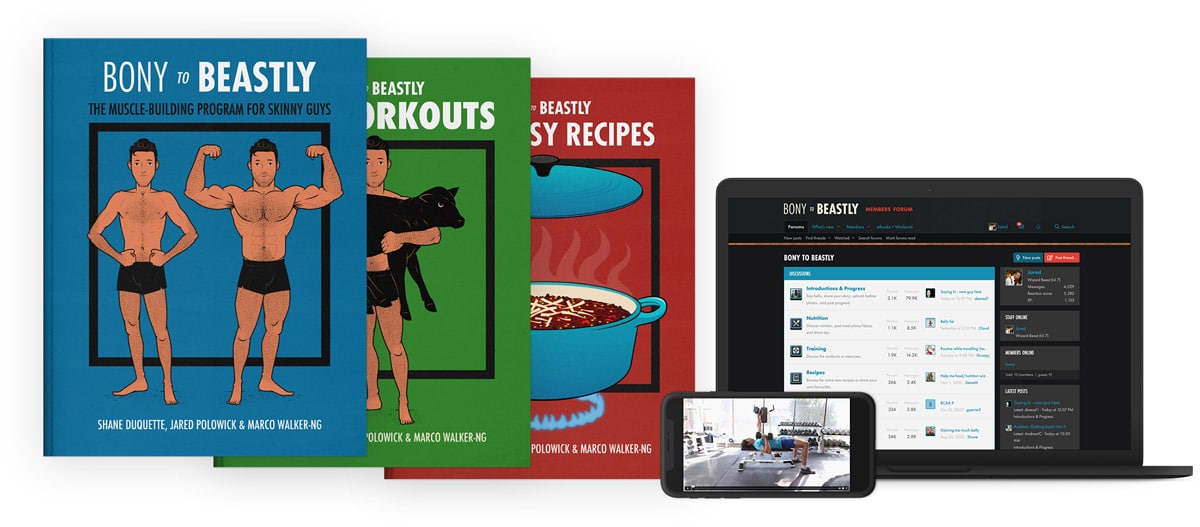
If you want to know all the ins and outs of building muscle, we have a free newsletter. If you want a full foundational bulking program, including a 5-month full-body workout routine, diet guide, recipe book, and online coaching, check out our Bony to Beastly Bulking Program. Or, if you want a customizable intermediate bulking program, check out our Outlift Program.

